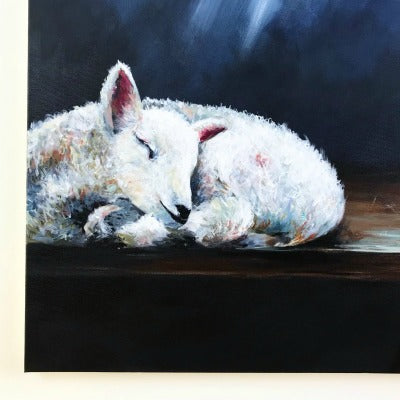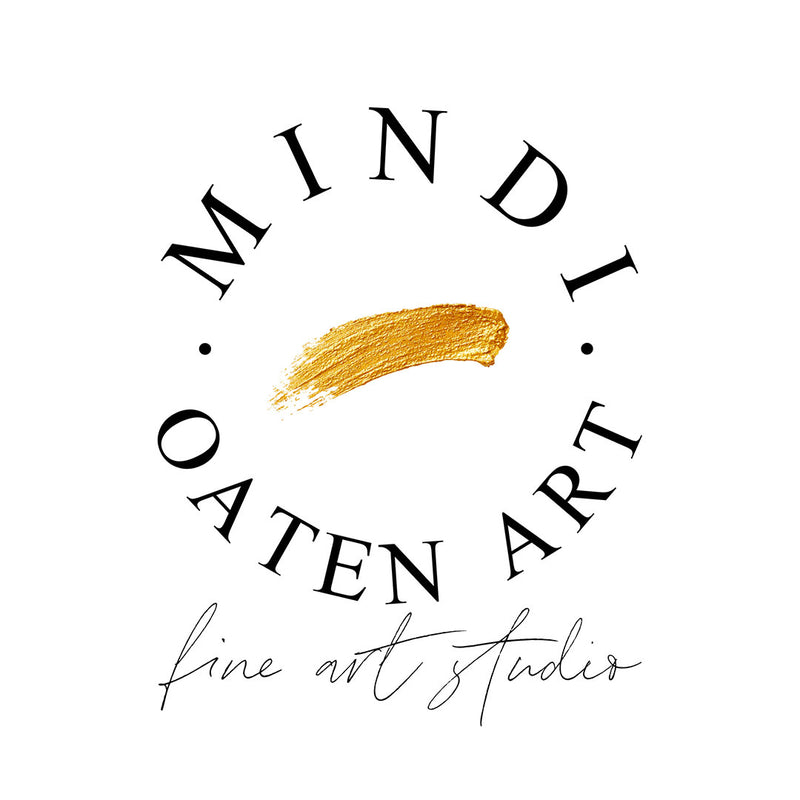Exodus | "The Anointed Deliverer"

Exodus | "The Anointed Deliverer"
I'm excited to share with you all my second painting! (I'm a little behind getting this out, but better late than never.) The book of Exodus. A picture representing Christ as "The Anointed Deliverer," our Passover Lamb.

God anointed and chose Moses to deliver the Israelites out of Egypt. Exodus foreshadows Christ, the Passover Lamb to come, who will deliver us from sin and redeem us back to the Father; just as Moses was chosen to deliver the Israelites out of slavery from Egypt.

The Sky
I painted the background sky dramatic and dark to represent God’s power and how he showed himself to Moses and the Israelites, through a cloud. The contrast of the dark sky and the Glory peaking through can also symbolize coming out of bondage. Light penetrating the dark. We can read this example from Exodus:
The Plague of Darkness
"Then the Lord said to Moses, “Stretch out your hand toward the sky so that darkness spreads over Egypt—darkness that can be felt.” So Moses stretched out his hand toward the sky, and total darkness covered all Egypt for three days. No one could see anyone else or move about for three days. Yet all the Israelites had light in the places where they lived." ~Exodus 10:21-23
God’s grace and glory in His redemption plan, shining through on his chosen people. The sky can be looked at in two different perspectives. First, looking up at it, seeing God’s glory shining down from the heavens. Secondly, viewing it from heavens perspective; seeing the cloud of witnesses peaking down from heaven into the opening, looking down at the finished Glory on earth.



The Lamb
As I painted the lamb, I chose to portray him sleeping. At first I was going to paint the lamb bound at the feet, ready to be sacrificed, but I didn't want to show that image. I realize that ultimately Jesus came to sacrifice his life so we may live, but I felt a better image was showing the lamb peaceful mainly for the composition. Not until I was half way into painting the lamb, I heard the Lord say that the resting position is important. I heard the Lord say; I rested in my divine purpose. And we too must learn from Him to rest in our divine purpose in life. Trusting in Him, he gives peace that passes all understanding. We are all chosen for a divine purpose in God’s plan. We must learn to rest in Him, trusting through trials and unknowns. His plan is perfect.
"Then Jesus said, “Come to me, all of you who are weary and carry heavy burdens, and I will give you rest. Take my yoke upon you. Let me teach you, because I am humble and gentle at heart, and you will give rest for your souls. For my yoke is easy to bear, and the burden I give you is light." ~Matthew 11:28-30

The Staff
The staff represents the instrument used by Moses to deliver the people and perform miracles through God's power. It also represented Moses’ calling as a shepherd, also foreshadowing the Good Shepherd who is Jesus. There is much symbolism throughout Exodus with the “rod of God.”
"But take this staff in your hand so you can perform miraculous signs with it." ~Exodus 4:17
Look what God chose to do through a shepherd’s staff. There was nothing special about a shepherd’s staff per se. God meets us where we are, and uses us where we are. For an ancient shepherd, he might use our staff; today he might use paint brushes or computers. The point is just that whatever is at hand, God can use it. God isn’t limited to what he can use—or whom he can choose. Moses’s own staff becomes the staff of God.
"So Moses took his wife and sons, put them on a donkey and started back to Egypt. And he took the staff of God in his hand." ~Exodus 4:20
The Bible has a wonderful message for us. God can work through instruments that could do nothing on their own. What matters is that God is with us. It is his power that transforms.

The Linen & Anointing Oil
I painted anointing oil in linen as a picture of the Anointed One. Anointing oil was used in the Old Testament for pouring on the head of the high priest and his descendants and sprinkling the tabernacle and its furnishings to mark them as holy and set apart to the Lord.
In ancient Israel, when someone was given a position of authority, oil was poured on his head to signify his being set apart for God’s service. Kings, priests, and prophets were anointed in such fashion. Anointing was a symbolic act to indicate God’s choosing.
In the New Testament Jesus Christ came as the Anointed One. “Christ” comes from the Greek word Christos, meaning “anointed one” or “chosen one.” This is the Greek equivalent of the Hebrew word Mashiach, or “Messiah.” “Jesus” is the Lord’s human name given to Mary by the angel Gabriel. “Christ” is His title, signifying Jesus was sent from God to be a King and Deliverer “Jesus Christ” means “Jesus the Messiah” or “Jesus the Anointed One.”

The Hyssop
I chose to add branches of hyssop lying beside the oil as a representation of obedience. God instructed the people to paint the blood of a sacrificed lamb over the doorposts with hyssop, like a paintbrush. (My kind of instruction - wink wink)
"Take a bunch of hyssop, dip it into the blood in the basin and put some of the blood on the top and on both sides of the doorframe. None of you shall go out of the door of your house until morning. When the Lord goes through the land to strike down the Egyptians, he will see the blood on the top and sides of the doorframe and will pass over that doorway, and he will not permit the destroyer to enter your houses and strike you down." ~Exodus 12:22-23
They had to actually apply the blood, through an act of obedience for the Passover angel to protect them from death. Much like us, it is not sufficient for us to just know about Jesus, we must apply him to our lives.
Hyssop is also a Biblical symbol of cleansing and purifying. David mentions hyssop in Psalm 51:7 as a spiritual cleansing as he confesses his sins.
“Cleanse me with hyssop, and I will be clean; wash me, and I will be whiter than snow.”
Hyssop is also mentioned at Jesus’ crucifixion, when the Roman soldiers offered Jesus a drink of wine vinegar on a sponge at the end of a stalk of hyssop (John 19:28-30). This was Jesus’ last act before He declared His work on earth finished and gave up His spirit. While the hyssop stalk may have been used for purely practical purposes, it is interesting that that particular plant was chosen. It is possible that God meant this as a picture of purification, as Jesus bought our forgiveness with His sacrifice. Just as in the Old Testament blood and hyssop purified a defiled person, so Jesus’ shed blood purifies us from the defilement of our sin.


As I mentioned in my previous blog, our Time to Revive team is studying through scripture over the next two years. There is a group of men in Indiana gathering once a month for a week, studying together for reviveSCHOOL. Last month I traveled to Indiana to be part of our team training and was able to speak about the Exodus painting with the group of men. It was such a fun evening being able to share how I came up with the painting, the process and the symbolism. The best part was to hear the how it spoke to the men individually. Being an artist, the most rewarding part of a finished piece is to hear different perspectives about the painting.
How does it speak to you?

Please respond and comment if you would like. I would love to hear others perspectives. That's the beauty of art... it can mean different things to each of us.
Many blessings to each one of you...stay tuned for the next painting, Leviticus!
Mindi

Comments on this post (4)
How meaningful the painting is ! Love this. thanks for sharing~~
— Tranh Viet AD
Mindi, I love your painting “The Anointed Deliverer” & would like to post this image on Facebook, with a Bible verse, on my “King James Version Bible” page, along with your Artist Credit Name and Website Link, so others can get in touch with you if they like. Would this be permissible?
— Susie Kirk
Mindi, I love your painting “The Anointed Deliverer” & would like to post this image on Facebook, with a Bible verse, on my “King James Version Bible” page, along with your Artist Credit Name and Website Link, so others can get in touch with you if they like. Would this be permissible?
— Susie Kirk
That’s a wonderful painting where you have captured the core OT message of the, “Lamb of God Who takes away the sin of the world.”
— Ruth Miller